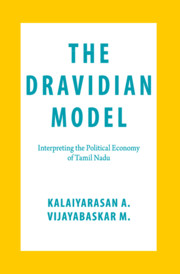Book contents
- Frontmatter
- Dedication
- Contents
- List of Tables
- List of Figures
- List of Abbreviations
- Acknowledgements
- 1 The Dravidian Model: An Introduction
- 2 Conceptualising Power in Caste Society
- 3 Democratising Education
- 4 Democratising Care
- 5 Broadening Growth and Democratising Capital
- 6 Transforming Rural Relations
- 7 Popular Interventions and Urban Labour
- 8 Fissures, Limits and Possible Futures
- Bibliography
- Index
4 - Democratising Care
Published online by Cambridge University Press: 08 July 2021
- Frontmatter
- Dedication
- Contents
- List of Tables
- List of Figures
- List of Abbreviations
- Acknowledgements
- 1 The Dravidian Model: An Introduction
- 2 Conceptualising Power in Caste Society
- 3 Democratising Education
- 4 Democratising Care
- 5 Broadening Growth and Democratising Capital
- 6 Transforming Rural Relations
- 7 Popular Interventions and Urban Labour
- 8 Fissures, Limits and Possible Futures
- Bibliography
- Index
Summary
India compares poorly with other developing countries on health parameters despite being among the fastest growing economies in the world (Balarajan, Selvaraj, and Subramanian 2011). In fact, compared to other developing countries, India has one of the lowest expenditures on health as a proportion of its gross domestic product (GDP) (A. Chakraborty 2019). As a result, citizens incur one of the highest out-of-pocket expenditures on health among countries with similar levels of income. Importantly, the increase in economic growth has not been matched by corresponding increases in human development in India. This is a paradox in a country where democratic practices have been better institutionalised as Evans and Heller (2018) point out. Countries with such democratic institutions are expected to invest additional resources towards welfare interventions in education and health compared to more authoritarian regimes that may emphasise growth at the expense of investments in human development.
As in the case of education, scholars use the elite bias hypothesis to explain this paradox (Das Gupta 2005). The Indian health system is biased in favour of elites as it focussed on curative health more than public health. Elites relied on curative medicines to insulate themselves from communicable diseases while neglecting public health, that is, to prevent exposure to such diseases for the rich and poor alike. Tamil Nadu is one of the few states that has, however, managed to work against this bias and build a robust public health infrastructure. The state for example, has already achieved the Millennium Development Goals (MDGs) of reduction in infant mortality rate (IMR) and maternal mortality ratio (MMR) (Vaidyanathan 2014). Given the macro-bias against healthcare, the state's achievements that we map in the next section clearly stand out. What made such outcomes possible?
This chapter traces a set of interventions in this regard, starting with the creation of a separate department for public health in the early-20th century. It goes on to identify factors contributing to the dramatic decline in fertility rate in the state including interventions focusing on maternity and early child care. The state, as mentioned in the previous chapter, is known for launching the nutritious noon meal scheme, a forerunner to similar schemes launched at the all-India level. The chapter also therefore discusses the history of processes instituted and the health implications of the nutritious noon meal scheme.
- Type
- Chapter
- Information
- The Dravidian ModelInterpreting the Political Economy of Tamil Nadu, pp. 82 - 111Publisher: Cambridge University PressPrint publication year: 2021



